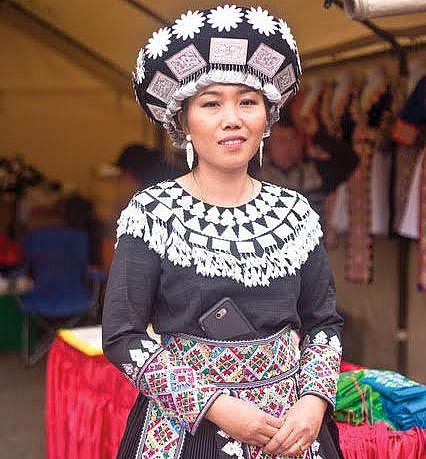Can uncovering an invisible health threat from refugees’ past stop history from repeating itself?

Nicole Fowler at Sacramento’s Hmong New Year celebration.
Sacramento is home to some of the largest populations of Hmong, Vietnamese and Cambodian refugees, forced to flee their homelands in the 1960s and ’70s. Over time, the city has embraced the rich contributions these immigrants made, even designating a corner of Sacramento “Little Saigon.” But for some of these longtime residents, forgetting their evacuation from the real Saigon, or a deadly escape across the Mekong River, may be a more complicated mental and physical health phenomenon than local officials ever understood.
In the last few years, my newspaper, Sacramento News & Review has worked to give the region’s South East Asian community more meaningful coverage. In doing so, it’s been brought to the newsroom’s attention by younger members of the community — second-and-third-generation Hmong and Vietnamese Americans — that some middle-aged and elderly people in their neighborhoods appear to have undiagnosed post-traumatic stress disorder from their war and refugee experiences. The young people believe this unacknowledged condition has been playing out with direct physical and mental health impacts for years, including manifestations of severe depression, elder isolation, domestic violence and gambling addiction.
After hearing these reports, I consulted with Dr. Carolee Tran, a Harvard-trained clinical psychologist and associate professor at UC Davis. Dr. Tran has been treating refugees from Southeast Asia for more than 20 years. She is also a Vietnamese refugee herself, having been evacuated as a little girl during the fall of Saigon. In addition to helping refugees in Sacramento, Dr. Tran has published a scientific study on domestic violence trends in the region’s Vietnamese community. Dr. Tran agrees with the observations that there is an issue with undiagnosed PTSD in elders who survived the violence of Vietnam.
My project for the 2018 California Fellowship will explore the story of undiagnosed PTSD in Southeast Asian refugees over the last 50 years, and will use that story as a pathfinder to identify the health impacts that could face the new, incoming Syrian refugee population if their PTSD goes widely unrecognized and untreated.
My strategy involves conducting interviews with Vietnam War refugees, paying close attention to reports of nightmares and flashbacks, depression and anxiety, guilt and shame, addiction, withdrawal, avoidance and emotional numbing. Without seeking individual diagnoses, I’ll consult top experts for comment on the overall trends I found, and explore what the findings say about the likelihood of untreated PTSD in those communities. I will also conduct similar interviews with newly arrived refugees from the Syrian war to see what patterns are being mirrored in their experiences — and what efforts are being made by health organizations to identify PTSD.
While my interviews with Vietnam refugees will focus mainly on the Sacramento and Chico areas, I’m very interested in meeting with recent refugees from Syria, especially ones who have compelling stories; and I’m willing to travel anywhere in the state to do those interviews. If anyone has contacts that might assist with finding those interview subjects, please let me know. Likewise, if any journalists have general advice or insights on the topic from their own reporting experience, sharing it would be greatly appreciated.
I’m excited to get started and find out how journalism can help confront the legacy of failure among institutions to understand the mental health needs of refugees.

